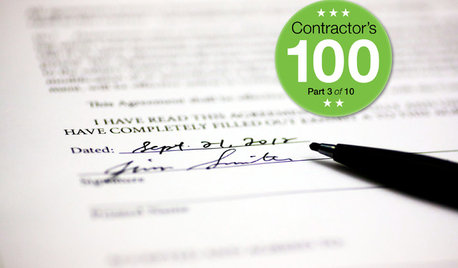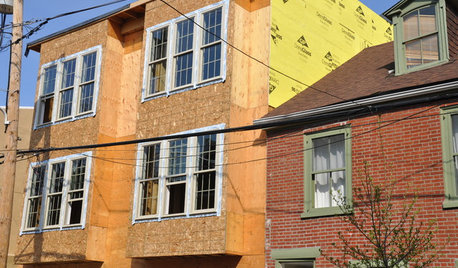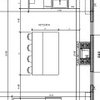Vague Builder's Contract - Please Help.
trinintybay
14 years ago
Related Stories

BUDGETING YOUR PROJECTConstruction Contracts: What to Know About Estimates vs. Bids
Understanding how contractors bill for services can help you keep costs down and your project on track
Full Story
CONTRACTOR TIPSWhat to Look for in a Contractor's Contract
10 basic ingredients for a contract will help pave the way to remodel happiness
Full Story
WORKING WITH PROS5 Steps to Help You Hire the Right Contractor
Don't take chances on this all-important team member. Find the best general contractor for your remodel or new build by heeding this advice
Full Story
BUDGETING YOUR PROJECTConstruction Contracts: What Are General Conditions?
Here’s what you should know about these behind-the-scenes costs and why your contractor bills for them
Full Story
DESIGN PRACTICEContracting Practice: Marketing Your Business
To keep those projects rolling in, combine old-school techniques with the latest in high-tech networking
Full Story
SUMMER GARDENINGHouzz Call: Please Show Us Your Summer Garden!
Share pictures of your home and yard this summer — we’d love to feature them in an upcoming story
Full Story
SELLING YOUR HOUSE10 Low-Cost Tweaks to Help Your Home Sell
Put these inexpensive but invaluable fixes on your to-do list before you put your home on the market
Full Story
SELLING YOUR HOUSE10 Tricks to Help Your Bathroom Sell Your House
As with the kitchen, the bathroom is always a high priority for home buyers. Here’s how to showcase your bathroom so it looks its best
Full Story
SELLING YOUR HOUSEHelp for Selling Your Home Faster — and Maybe for More
Prep your home properly before you put it on the market. Learn what tasks are worth the money and the best pros for the jobs
Full Story
WORKING WITH PROS3 Reasons You Might Want a Designer's Help
See how a designer can turn your decorating and remodeling visions into reality, and how to collaborate best for a positive experience
Full Story






jmagill_zn4
trinintybayOriginal Author
Related Discussions
Builder's Contract
Q
Contract with Amish builders?
Q
Builder Contracts: Input please
Q
Can builder sign with another buyer if I'm still under contract
Q
jmagill_zn4
sue36
jmagill_zn4
trinintybayOriginal Author
jmagill_zn4
jmagill_zn4
trinintybayOriginal Author
macv
macv
trinintybayOriginal Author
sue36
jmagill_zn4
macv
jmagill_zn4
macv
macv
jmagill_zn4
macv
jmagill_zn4
macv
jmagill_zn4
macv
jmagill_zn4
macv
jmagill_zn4
macv
jmagill_zn4
macv
jmagill_zn4
macv
trinintybayOriginal Author
macv
niffy
trinintybayOriginal Author
trinintybayOriginal Author